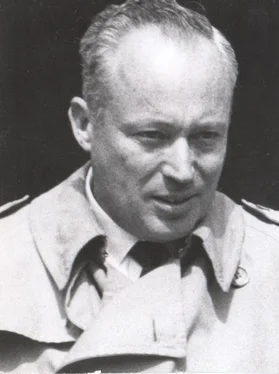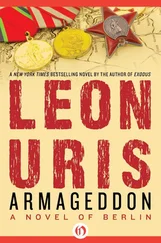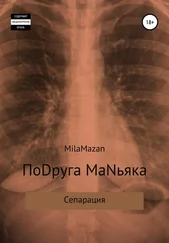... The little village north of Rypin. What was its name? He had organized fifty strays for an attack. They stopped in the village for water. The children ran out of the school into the village square to cheer them. The priest came out and the women came out with bread in their hands.
No one heard the airplane, it came so fast Rat-a-tat-rat-a-tat—and it was gone, and five children lay bleeding in the square. The priest knelt over them, saying prayers, and the women wailed. The little girl dead, clutching the ragdoll. Rat-a-tat—and planes came in again.
“We have fought with honor,” Brigadier Zygmunt Bozakolski said. “I am surrendering the Seventh Brigade. I expect you gentlemen to conduct yourselves as Ulany officers.”
The prison pen. The accordions of barbed wire. The crisscross of German guards. “Styka, as soon as night falls we are going through the wire and swim the river.”
“I’m with you, Captain.”
Styka fell on the wire and made himself a human bridge, and the other five ran over the top of him. He followed after them. When they reached the riverbank the air was filled with whistles and sirens and shouts in German.
Flashlights probed the darkness.
The river was swift and pulling them back to shore. The lights streaked over the water. Blam! Blam! Swim for your life! Swim for your life!
A scream! One of them hit. He is dragged by the current like a limp rag.
“I’m going under, Captain. I can’t make it.”
Styka gurgled and thrashed hopelessly. “Relax, Styka—relax.” Andrei’s hand was under his chin, his free arm driving at the water.
“I’m drowning! I’m drowning! Mother of God!” Styka screamed.
“Stay calm, you son of a bitch ...”
Andrei pulled him up on the bank and knelt over him and pumped the water from his lungs and slapped his face until he came around.
... And then ... what happened then?
Andrei looked up. The peasant and his wife. The doctor. And Styka, crying.
“If you wish to surrender, Sergeant, you have my permission.”
“What about you, sir?”
Andrei shook his head.
“You are a damned fool!” the doctor said.
“Then I guess I am a damned fool too,” Styka said.
“You’re going with him? You know he can’t make it. Why?”
Styka tried to think. It was hard for him. He shrugged. “Because he is my captain,” he said.
Chapter Twelve
FOR THE FIRST FEW days after the war began, England and France desperately tried to get the German army to withdraw, ready to impose another Munich sellout on Poland.
When Germany refused, England and France had to do what they should have done years before; they declared war. With Poland’s doom more certain each day, the British and French embassies in Warsaw turned over much of their papers and duties to the neutral Americans.
The Americans were short-staffed, but the spirit remained excellent even with extra burdens.
Well into the second week, complete catastrophe for Poland was evident.
Gabriela left the Embassy after a shift of fourteen hours. Thompson insisted she get some rest Instead, she got one of the marine guards to drive her to Zoliborz to see the Bronski family, with whom she had lost contact for several days. When she arrived, Zoshia told her that both Rachael and Deborah were at the Bathyran Orphanage. She followed after them.
The bombing raids had increased in intensity as the German armies moved in on Warsaw. The city was determined to fight on. At the orphanage, Susan Geller had sent out an emergency call for help to move the facilities underground so they would at least have food, medicine, and sleeping places during the air raids. Gabriela worked alongside Deborah, Susan, Rachael, and Alex and Sylvia Brandel through the night and all the next day, helping move supplies underground, catching only a few naps whenever they could. She returned to the Embassy. Things had slowed down, and Thompson sent her home again.
She had reached a state of numbness. She looked up at her flat from the street. It was so lonely there. Several buildings near and on the square had been hit by bombs. She found herself doing what she always did when she was lonesome—she walked north to Leszno Street and climbed the four flights to Andrei’s flat. As always, the door was open. Just as she arrived the air-raid sirens began. She stood by the window, strangely fascinated by the leaping flames from the slums only a mile away. Some of the fire appeared to be coming from the Old Town. What a tragedy if anything happened to the old square, she thought.
An hour earlier the bombers had started the incendiary attacks to light their way over Warsaw during the night. This time the raiders were hitting acres of workers’ homes in Praga across the river.
On the streets below she could hear the confusion as firemen rushed to the slum area, where the houses were so tightly packed and inflammable that the fire could spread all over Warsaw if not contained quickly.
Dull booms from Praga.
There was neither a Polish gun nor a Polish plane to stop the Germans. But the raiders kept coming back to smash the will of the people to resist.
She shut the window and taped the blackout paper into place, then lit the room with a single lamp beside the bed and stretched out to read herself to sleep with Walt Whitman’s Leaves of Grass.
A knock on the door startled her.
“Come in.”
Alexander Brandel entered the room. She was glad he had come. “I didn’t mean to startle you,” he said. “I went to the Embassy and your place first.”
“Is everything all right at the orphanage?”
“Fine, fine. The children are so wonderful. We try to keep it like a game. I think they are smarter than we are.”
“How is it outside?”
“The whole northern end is burning. Praga is catching hell. So, Mayor Starzynski says to fight on—so, we fight on. Could I have some cognac?”
Gabriela took a bottle from the cabinet and looked at Alex with suspicion. He was mostly a teetotaler, except when Andrei was around. He drank it down very quickly. He coughed as the fire hit his stomach. Perhaps just the air raid, Gabriela thought. It is enough to make anyone nervous. Then Alex began to mop his brow. There was something serious on his mind.
“What is it?” Gabriela said.
“Andrei is in Warsaw.”
She closed her eyes and held her stomach as though she had been hit. She tried to ask questions, but her lips would not form words.
“Let me first say that he is all right.”
“You swear ... you swear it now?”
“I swear it. He has been wounded, but it is not serious. Please sit down.”
“Where was he wounded, Alex?”
“I tell you it’s not serious and I beg you to be calm.”
“Where is he?”
“Will you please get control of yourself?”
“Where is he!”
“Gabriela ... please ...”
“You’re lying! He’s been hurt.” And then she fought herself into control. “All right, tell me.”
“God only knows how he was able to get back to Warsaw. It was a miracle. No one will ever know what he has been through.”
“Alex ... I beg you ... the truth. How badly is he hurt?”
“His heart is broken, Gabriela.”
“Where is he?”
“At the bottom of the stairs.”
She lunged for the door, screaming his name. Alex caught her and clamped his hand over her mouth. “Now listen to me, Gabriela! He is broken, without spirit. You are going to have to be a very brave girl.”
“Andrei, Andrei,” she whimpered.
“He came to me first and asked me to come to you because ... he does not want you to look at him the way he is. Do you understand that?”
She nodded.
“Then make the room dark and I will send him up.”
Читать дальше












